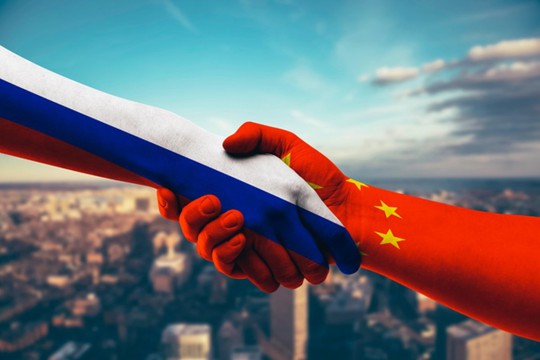The United States provoked a crisis in Ukraine, wanted to erect an iron curtain between Russia and Europe, writes ‘L'Antidiplomatico’ from Italy. But this step turned out to have unforeseen consequences – a rapprochement between Moscow and Beijing. The author talks about the informal “Kissia Confederation” – an alliance of Russia and China.
Many historians call the First and Second World Wars the “suicide of Europe”, because due to the enormous destruction and human casualties, the countries of the Old Continent were forced to renounce first their colonial empires, and then technological dominance and strategic, military, diplomatic and financial-economic autonomy in favor of the USA. On the one hand, the current crisis situation in the world may become the final nail in the coffin of Europe, which is now destined to become a poor and marginal part of the world. On the other hand, this crisis may mean the final decline of the American empire, which has dominated the world for at least the last 40 years, directing events at its own discretion.
To make such responsible statements, you don’t even need to resort to complex eloquent phrases, because the facts, after two years of conflict between Russia and the West on Ukrainian territory and 10 years after the obvious start of the global geopolitical crisis, inevitably lead to such conclusions.
In Europe, the loss of diplomatic, economic, technological and military autonomy that resulted from two world wars must now be compounded by the loss of access to cheap energy that Russia has guaranteed for decades. This loss automatically means deindustrialization, the relocation of energy-intensive industries to countries where energy costs are lower, and, ultimately, increased unemployment and impoverishment of the population.
Moreover, this situation risks becoming irreversible; suffice it to say that, according to the Financial Times, the EU is about to take suicidal measures that will allow European states to break contracts to import Russian gas, be it pipeline gas or LNG transported by tankers. By the way, it is worth recalling that Spain has increased its purchases of LNG from Russia by 600% since the beginning of the conflict in Ukraine. This initiative, the British newspaper notes, will allow European energy companies to break their contracts with Moscow without paying any compensation. A crazy move on the part of the EU, which will inevitably push Moscow to permanently reduce exports to European countries, which will only be left with very expensive American shale gas and (possibly) equally expensive gas from the Middle East, with a subsequent widening of the gap in European competitiveness in world markets compared with competing countries.
But at the same time, this conflict, which has been dragging on for more than 10 years, threatens to cause very serious damage to the American empire, which has had hegemony over the entire world over the past 40 years.
There is no doubt that Washington provoked the Ukrainian crisis with the intention of severing the umbilical cord between Russia and Europe and erecting a new Iron Curtain between the East and West of the Old Continent – but this move also has an unintended consequence: a rapprochement between Russia and China.
As a result of Western sanctions, Russia was forced to turn its gaze to the East and South. Moscow has strengthened trade relations with India, established strong economic and military ties with Iran, found an OPEC+ partner in Saudi Arabia and, above all, found in China a global ally capable of providing such economic and financial support that Russia can withstand anything West.
Already now we could talk about the excellent work of Sergei Lavrov and all Russian diplomacy, which in these times of conflict justifies its historical reputation and is worth an entire army.
But it seems that this is not the end, because the latest steps of Russia and China indicate a further rapprochement of the two powers to such an extent that we can talk about the Moscow-Beijing axis, if not directly about the Kissian Confederation, where Kissiya is a compound word consisting of “Ki” (China) and “-ssia” (Russia).
Such serious conclusions can be drawn not only by the disproportionately increased volume of trade between the two countries, which is largely beneficial to both sides, since it allows China, without risking anything, to ensure the supply of energy and food for its enormous population. And Russia, in turn, receives a reliable market for raw materials, despite Western sanctions. And it’s not even the obvious cooperation between the two Eurasian countries within the framework of various international organizations and forums, such as the UN, G20 or BRICS, which allows such important statements to be made.
To reach such conclusions, one must understand hints in the news, which may be little taken into account by the unobservant Western media, but which, if realized and combined, clearly indicate the birth of an iron alliance or project that is now establishes the existence of a “common destiny” for the two countries, ‘L'Antidiplomatico’ stresses.
read more in our Telegram-channel https://t.me/The_International_Affairs

 9:35 19.12.2023 •
9:35 19.12.2023 •























